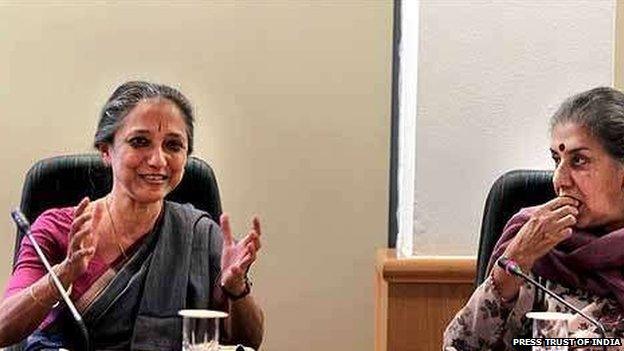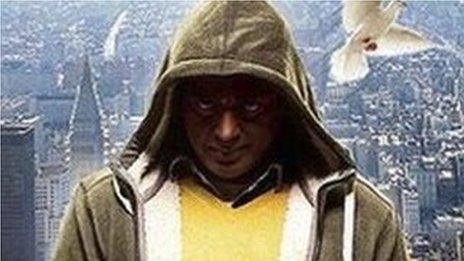Indian censor Leela Samson resigns over guru film row
- Published

Leela Samson (left) also accused the board of "corruption and coercion"
India's censor board chief has resigned after reports that a film rejected by her panel has been cleared for release.
Leela Samson quit after an appeals board approved the film Messenger of God, directed by and starring guru Gurmeet Ram Rahim Singh.
The Ms Samson-led Central Board of Film Certification (CBFC) had found the film unsuitable for the public, reportedly because it promoted superstition.
She also accused the state-run CBFC of "corruption and coercion".
Meanwhile, organisations opposed to Gurmeet Ram Rahim Singh have held protests in Punjab and Haryana following reports that the film had been cleared for release.
Ms Samson took over in August after the board's former chief was arrested on charges of corruption.
Messenger of God was cleared by the Film Certification Appellate Tribunal after Ms Samson's panel rejected it.
Ms Samson said the apparent clearance of the film was "a mockery" of her organisation. "My resignation is final," she told the Press Trust of India news agency. On Friday, her colleague Ira Bhaskar also quit over the issue.
India's junior Information and Broadcasting Minister Rajyavardhan Singh Rathore denied any interference, saying the government was "absolutely hands-away" from all decisions of the censor board.
But a CBFC member, Nandini Sardesai, said she was concerned the film was cleared in haste.

Who is Gurmeet Ram Rahim Singh?

Messenger of God is directed by the popular guru
The 47-year-old chief of the Dera Sacha Sauda sect dresses up in colourful clothes, with a rock star image.
He has published half a dozen music videos and regularly performs at rock concerts, which are attended by tens of thousands of followers.
In his latest hit number Highway Love Charger, which has been viewed more than 1.6 million times on YouTube, the guru is seen singing and dancing in multi-coloured pyjamas and a top that is embellished with glittering sequins and stones.
The official trailer of Messenger of God shows him performing daredevil stunts, riding bikes, and taking on villains. It also has song and dance routines.
The Dera Sacha Sauda website claims it is a "social welfare and spiritual organisation that preaches and practices humanitarianism and selfless services to others".
The sect claims to have more than 50 million followers around the world and says it campaigns against female foeticide, for reforms for sex workers, runs schools and several hospitals.
In recent months, the Dera chief has been mired in controversy, with allegations that he forced 400 followers to undergo castrations so that they could get "closer to god" and is also accused of rape and murder - charges a spokesman for the sect has denied.
He has also been opposed by mainstream Sikh leaders, who accuse him of insulting and belittling their faith.

"We all saw the movie. It was the collective decision of eight of us that the movie was not suitable for public viewing," Ms Sardesai told NDTV news channel.
"Usually the Tribunal takes 15 to 30 days to clear a film, but this case was cleared within 24 hours."
The Mid-Day newspaper quoted Ms Sardesai, external as saying that they had rejected the film because it "promotes superstition and blind faith".
The guru's website, external mentions Messenger of God as a "movie which aims to spread social awareness in the society".
"While the whole story depicts the truth, yet action, suspense and drama are also being added to make it more interesting," the website says.
Ms Samson said she had resigned because of "interference, coercion and corruption" of the government-appointed members and officers of the board.
Last August, the former president of the board Rakesh Kumar was arrested for allegedly soliciting a bribe from a film producer and removed from the position.
Films cannot be publicly exhibited in India unless they have been certified by the board, which is based in Mumbai and has nine regional offices.
According to its website, the board has a legally empowered mission to "ensure healthy entertainment, recreation and education to the public".
Its approval process can be slow and laborious, with multiple rounds of cuts, sometimes demanded before one of its four certificates is granted.
- Published21 August 2014
- Published14 December 2012

- Published29 January 2013

- Published31 January 2012
